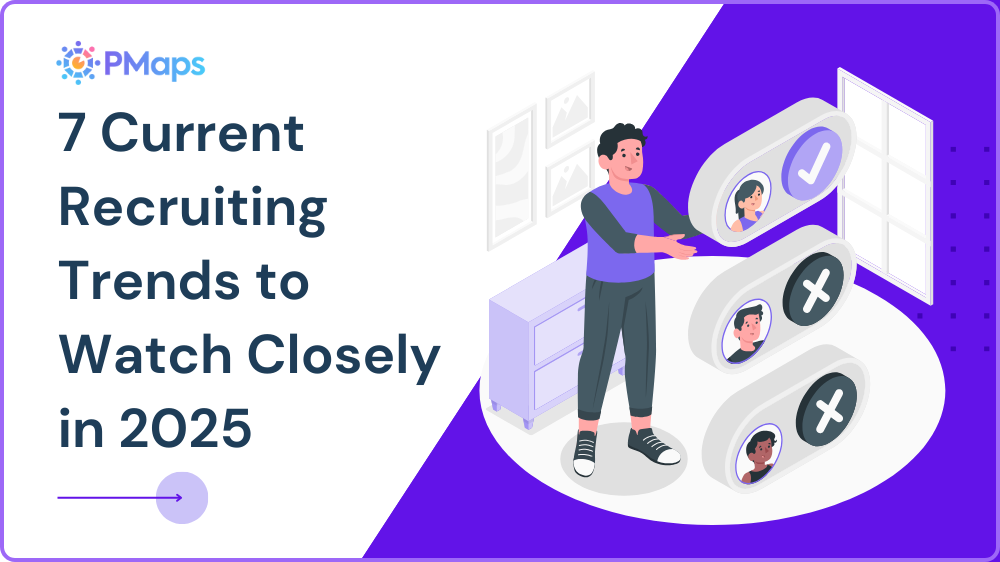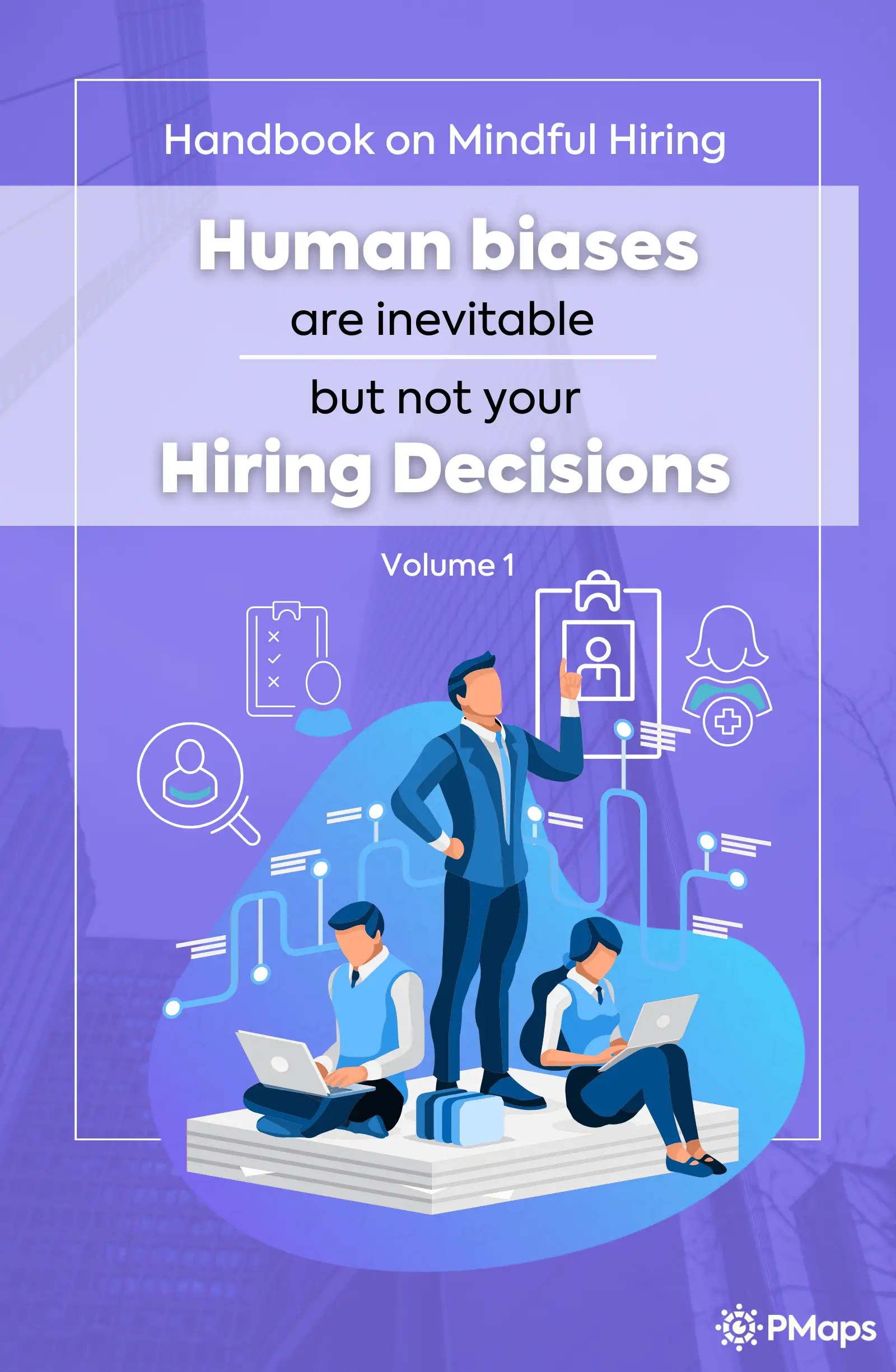
The latest recruiting trends in 2025 are reshaping how organizations attract and retain top talent. From AI-powered automation to the growing emphasis on soft skills, hiring is undergoing a profound transformation. Traditional methods no longer align with modern workforce expectations, prompting HR leaders to adopt smarter, more adaptable strategies.
In fact, 95% of recruiters believe AI will significantly enhance the candidate experience, marking a clear shift toward more efficient and engaging hiring journeys.
For senior talent professionals like yourself, staying ahead means more than awareness—it requires action. This blog dives deep into the most current recruiting trends redefining talent acquisition today. Each trend has been curated to help you future-proof your hiring processes and elevate candidate quality without inflating recruitment costs.
Whether you’re overseeing large-scale talent pipelines or refining leadership hiring frameworks, these insights are essential to navigating the year ahead.
From AI to Soft Skills: Latest Recruiting Trends in 2025 Transforming the Workplace
Recruitment in 2025 is no longer a linear function. It’s dynamic, data-enriched, and deeply human. The recruiting trends emerging this year reflect a workplace that's evolving from rigid qualifications to holistic potential. Organizations are embracing agility by combining technological precision with people-first thinking.
Three pillars are defining this transformation:
- AI in Recruitment: Automating time-consuming tasks while enabling deeper candidate analysis.
- Soft Skills First: Shifting focus from academic credentials to behavioral and interpersonal competencies.
- Data-Driven Decisions: Replacing gut instinct with analytics to enhance hiring accuracy and efficiency.
This shift is also driven by a more informed and digitally native workforce, expecting faster, fairer, and more personalized hiring experiences. For decision-makers, these latest recruiting trends aren’t optional upgrades—they're critical shifts to remain competitive in the talent economy.
📍 Discover how we help HR teams overcome recruitment challenges through intelligent assessments and AI integration.
AI and Automation in Talent Acquisition
The role of AI in recruitment is no longer a future prospect—it’s a strategic necessity. In 2025, artificial intelligence is optimizing nearly every stage of talent acquisition, from job matching to final onboarding. AI technologies are transforming hiring teams into data-savvy decision-makers, enabling faster and fairer hiring with fewer resources.
By automating repetitive tasks such as resume screening and interview scheduling, recruiters reclaim valuable hours to focus on what matters most—building authentic candidate relationships. This shift allows HR leaders to move away from transactional recruitment and toward strategic workforce planning.
Why AI in Recruitment is Taking the Center Stage?
- 72% of recruiters say AI has significantly enhanced candidate sourcing. Tools now scan large talent pools to identify candidates aligned with job requirements and company culture.
- AI-powered screening enables recruiters to assess resumes and applications in seconds, reducing human bias and ensuring fair evaluations across all applicants.
- Companies using intelligent automation report up to a 70% reduction in time-to-hire, allowing them to act faster in competitive hiring markets.
- AI scheduling assistants improve operational efficiency, resulting in a 20% increase in candidate show-up rates for interviews.
- Perhaps most telling, 95% of recruiters believe AI significantly enhances the candidate experience—providing timely communication, personalized feedback, and a smoother journey from application to offer.
These outcomes highlight why AI in recruitment is more than just automation—it's a pathway to elevate the candidate experience and organizational efficiency simultaneously.
Rise of Data-Driven Recruitment
The era of instinct-led hiring is being replaced by a new hiring paradigm—data-driven recruitment. In 2025, leading HR teams are using analytics not just to evaluate candidates, but to refine entire hiring strategies. From sourcing to selection, data is now the currency of smarter, more accountable talent decisions.
Data-driven recruitment transforms your hiring process into a feedback loop—one that constantly learns, improves, and predicts. This means clearer visibility into what works, what doesn’t, and where the next high-performing hire is likely to come from.
Why Data is the New Backbone of Talent Acquisition?
- AI-selected candidates are 14% more likely to pass interviews and receive job offers, proving the predictive power of analytics over human instinct.
- Companies using recruitment analytics see up to 18% higher offer acceptance rates, as data allows for better alignment between role expectations and candidate preferences.
- Internally, 28% of HR leaders now rely on analytics to monitor recruiter performance, time-to-hire, and cost-per-hire across departments.
Simply put, recruiting trends are no longer about “more resumes”—they’re about smarter, statistically guided decisions that reduce cost and improve quality simultaneously.
Soft Skills First: Redefining Talent Evaluation
The demand for soft skills is no longer a supplementary trend—it’s now a hiring priority. As automation handles more technical and repetitive tasks, human-centric skills are becoming the true differentiator. In 2025, organizations are intentionally shifting away from rigid qualification checklists and toward evaluating emotional intelligence, adaptability, creativity, and collaboration.
This evolution signals a broader realization: technical know-how can be trained, but core human competencies often cannot. Companies investing in soft skills assessments today are better positioned to build resilient, high-performing teams for tomorrow.
Why Are Soft Skills the New Power Skills?
- According to LinkedIn, 89% of hiring failures stem from a lack of soft skills rather than technical shortcomings.
- Emotional intelligence, critical thinking, and problem-solving consistently top employer priority lists, across industries.
- Soft skills enable cross-functional collaboration, leadership emergence, and customer-centric innovation—especially crucial in hybrid work models.
- Talent with high soft skills proficiency demonstrates better retention rates, engagement scores, and internal mobility success.
Virtual Hiring Platforms Becoming the Norm
Virtual hiring is no longer a temporary solution—it’s the new default. In 2025, virtual interviews, assessments, and onboarding processes are integral to modern talent acquisition strategies.
Remote and hybrid work models have shifted candidate expectations toward seamless digital experiences that are fast, flexible, and fair.
Organizations adopting virtual hiring platforms are seeing measurable gains: faster time-to-hire, broader talent reach, and stronger employer branding in competitive markets. This shift is particularly relevant to IT recruitment in Krakow, where demand for tech talent is high and virtual platforms help connect employers with a wider pool of qualified candidates.
Why Virtual Hiring is Dominating?
- 62% of employers now prefer remote-first hiring models for entry and mid-level roles.
- Virtual assessments offer structured evaluations, reducing interviewer bias and human error.
- Digital interviews enhance scheduling flexibility, increasing candidate participation rates.
- Companies using virtual onboarding report 30% higher new-hire satisfaction and retention.
Internal Mobility: The New Competitive Advantage
In 2025, organizations aren't just hiring externally—they’re growing talent from within.
Internal mobility is emerging as a powerful recruitment strategy, helping companies fill roles faster, boost employee engagement, and cut hiring costs.
Top employers are redesigning career pathways to promote movement across roles, departments, and locations. This approach not only retains high performers but also builds a resilient, future-ready workforce.
Why Internal Mobility Matters?
- Two-thirds of employees say they would stay longer if they saw a clear internal career path.
- Organizations with strong internal mobility programs fill roles 20% faster and at lower cost.
- Promoting from within enhances organizational loyalty, culture fit, and productivity.
- Internal candidates require less ramp-up time, accelerating performance outcomes.
Reducing Hiring Costs Without Compromising Quality
Recruitment success is not just about who you hire—but how efficiently you do it. With rising talent acquisition costs, organizations are under pressure to optimize budgets while still securing top-tier talent. The focus now is on precision over volume—investing in smarter sourcing, automated assessments, and data-driven evaluation to cut waste, shorten cycles, and boost quality per hire.
How Smart Hiring Cuts Costs?
- Companies using AI screening save up to 50% on manual hiring efforts.
- Structured assessments reduce bad hires, cutting costly turnover risks.
- Pre-employment testing trims interview rounds, saving recruiter and manager time.
- Streamlined onboarding through predictive analytics accelerates new-hire productivity.
Small Businesses Are Adapting to New Recruiting Trends
Small and mid-sized businesses (SMBs) are jumping right into the competitive talent market—they're leveraging the same smart strategies once reserved for enterprise giants.
With access to agile hiring technologies, affordable assessments, and remote recruiting platforms, SMBs are now building stronger, faster, and more scalable hiring processes.
Why Small Businesses Must Adapt?
- Digital-first recruitment allows SMBs to access broader, diverse talent pools.
- Affordable online assessment platform level the playing field by validating skills without heavy HR overhead.
- Virtual onboarding and remote interviews cut geographical and operational hiring barriers.
- Focused employer branding enhances candidate engagement, even against bigger brands.
Conclusion: Shape the Future of Hiring, Today
The recruiting landscape in 2025 demands more than just adaptation—it demands leadership. From embracing AI and data-driven insights to prioritizing soft skills and virtual hiring, forward-thinking organizations are rewriting the playbook.
The latest recruiting trends are clear: those who move first will win the race for top talent. And at PMaps, we help you not just keep pace—but lead with confidence. Our science-backed assessments, AI-enabled hiring solutions, and visual, bias-free evaluations are designed to future-proof your talent strategy. You can book a Free Consultation with our Assessment Experts. Call us at 8591320212 or email at assessment@pmaps.in.




.png)




